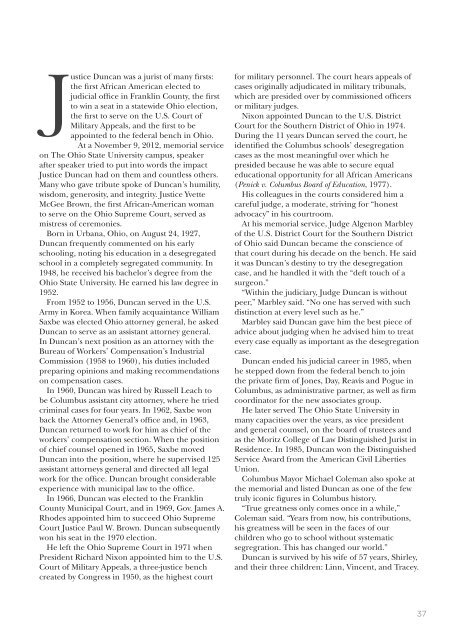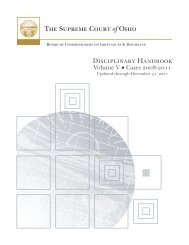ANNUAL REPORT - Supreme Court - State of Ohio
ANNUAL REPORT - Supreme Court - State of Ohio
ANNUAL REPORT - Supreme Court - State of Ohio
Create successful ePaper yourself
Turn your PDF publications into a flip-book with our unique Google optimized e-Paper software.
Justice Duncan was a jurist <strong>of</strong> many firsts:<br />
the first African American elected to<br />
judicial <strong>of</strong>fice in Franklin County, the first<br />
to win a seat in a statewide <strong>Ohio</strong> election,<br />
the first to serve on the U.S. <strong>Court</strong> <strong>of</strong><br />
Military Appeals, and the first to be<br />
appointed to the federal bench in <strong>Ohio</strong>.<br />
At a November 9, 2012, memorial service<br />
on The <strong>Ohio</strong> <strong>State</strong> University campus, speaker<br />
after speaker tried to put into words the impact<br />
Justice Duncan had on them and countless others.<br />
Many who gave tribute spoke <strong>of</strong> Duncan’s humility,<br />
wisdom, generosity, and integrity. Justice Yvette<br />
McGee Brown, the first African-American woman<br />
to serve on the <strong>Ohio</strong> <strong>Supreme</strong> <strong>Court</strong>, served as<br />
mistress <strong>of</strong> ceremonies.<br />
Born in Urbana, <strong>Ohio</strong>, on August 24, 1927,<br />
Duncan frequently commented on his early<br />
schooling, noting his education in a desegregated<br />
school in a completely segregated community. In<br />
1948, he received his bachelor’s degree from the<br />
<strong>Ohio</strong> <strong>State</strong> University. He earned his law degree in<br />
1952.<br />
From 1952 to 1956, Duncan served in the U.S.<br />
Army in Korea. When family acquaintance William<br />
Saxbe was elected <strong>Ohio</strong> attorney general, he asked<br />
Duncan to serve as an assistant attorney general.<br />
In Duncan’s next position as an attorney with the<br />
Bureau <strong>of</strong> Workers’ Compensation’s Industrial<br />
Commission (1958 to 1960), his duties included<br />
preparing opinions and making recommendations<br />
on compensation cases.<br />
In 1960, Duncan was hired by Russell Leach to<br />
be Columbus assistant city attorney, where he tried<br />
criminal cases for four years. In 1962, Saxbe won<br />
back the Attorney General’s <strong>of</strong>fice and, in 1963,<br />
Duncan returned to work for him as chief <strong>of</strong> the<br />
workers’ compensation section. When the position<br />
<strong>of</strong> chief counsel opened in 1965, Saxbe moved<br />
Duncan into the position, where he supervised 125<br />
assistant attorneys general and directed all legal<br />
work for the <strong>of</strong>fice. Duncan brought considerable<br />
experience with municipal law to the <strong>of</strong>fice.<br />
In 1966, Duncan was elected to the Franklin<br />
County Municipal <strong>Court</strong>, and in 1969, Gov. James A.<br />
Rhodes appointed him to succeed <strong>Ohio</strong> <strong>Supreme</strong><br />
<strong>Court</strong> Justice Paul W. Brown. Duncan subsequently<br />
won his seat in the 1970 election.<br />
He left the <strong>Ohio</strong> <strong>Supreme</strong> <strong>Court</strong> in 1971 when<br />
President Richard Nixon appointed him to the U.S.<br />
<strong>Court</strong> <strong>of</strong> Military Appeals, a three-justice bench<br />
created by Congress in 1950, as the highest court<br />
for military personnel. The court hears appeals <strong>of</strong><br />
cases originally adjudicated in military tribunals,<br />
which are presided over by commissioned <strong>of</strong>ficers<br />
or military judges.<br />
Nixon appointed Duncan to the U.S. District<br />
<strong>Court</strong> for the Southern District <strong>of</strong> <strong>Ohio</strong> in 1974.<br />
During the 11 years Duncan served the court, he<br />
identified the Columbus schools’ desegregation<br />
cases as the most meaningful over which he<br />
presided because he was able to secure equal<br />
educational opportunity for all African Americans<br />
(Penick v. Columbus Board <strong>of</strong> Education, 1977).<br />
His colleagues in the courts considered him a<br />
careful judge, a moderate, striving for “honest<br />
advocacy” in his courtroom.<br />
At his memorial service, Judge Algenon Marbley<br />
<strong>of</strong> the U.S. District <strong>Court</strong> for the Southern District<br />
<strong>of</strong> <strong>Ohio</strong> said Duncan became the conscience <strong>of</strong><br />
that court during his decade on the bench. He said<br />
it was Duncan’s destiny to try the desegregation<br />
case, and he handled it with the “deft touch <strong>of</strong> a<br />
surgeon.”<br />
“Within the judiciary, Judge Duncan is without<br />
peer,” Marbley said. “No one has served with such<br />
distinction at every level such as he.”<br />
Marbley said Duncan gave him the best piece <strong>of</strong><br />
advice about judging when he advised him to treat<br />
every case equally as important as the desegregation<br />
case.<br />
Duncan ended his judicial career in 1985, when<br />
he stepped down from the federal bench to join<br />
the private firm <strong>of</strong> Jones, Day, Reavis and Pogue in<br />
Columbus, as administrative partner, as well as firm<br />
coordinator for the new associates group.<br />
He later served The <strong>Ohio</strong> <strong>State</strong> University in<br />
many capacities over the years, as vice president<br />
and general counsel, on the board <strong>of</strong> trustees and<br />
as the Moritz College <strong>of</strong> Law Distinguished Jurist in<br />
Residence. In 1985, Duncan won the Distinguished<br />
Service Award from the American Civil Liberties<br />
Union.<br />
Columbus Mayor Michael Coleman also spoke at<br />
the memorial and listed Duncan as one <strong>of</strong> the few<br />
truly iconic figures in Columbus history.<br />
“True greatness only comes once in a while,”<br />
Coleman said. “Years from now, his contributions,<br />
his greatness will be seen in the faces <strong>of</strong> our<br />
children who go to school without systematic<br />
segregration. This has changed our world.”<br />
Duncan is survived by his wife <strong>of</strong> 57 years, Shirley,<br />
and their three children: Linn, Vincent, and Tracey.<br />
37

















